Chili Palmer Exists In Epix's 'Get Shorty' TV Show [Interview]
Get Shorty was a hit movie in 1995, part of John Travolta's post-Pulp Fiction comeback. He played Chili Palmer, a shylock who came to Hollywood to collect a debt from a producer (Gene Hackman) and fell in love with the movie business. The success of the movie inspired Elmore Leonard to write a sequel. Be Cool was also made into a movie starring Travolta.
On Epix, Get Shorty can get away with the same level of sex and violence as an HBO show. The original series does not adapt Leonard's text. Instead, it is an original story that shares similar themes. Miles Daly (Chris O'Dowd) comes to Hollywood to collect from a screenwriter, then tries to produce the script, enlisting a has-been schlock producer (Ray Romano) to help.
Series creator Davey Holmes and executive producer/director Adam Arkin spoke with /Film about Get Shorty, which premiered last night on Epix.
Is today's film business quite different than the industry 20 years ago when the book and movie were set?Holmes: Yeah, and we made a decision. We thought about it and made the decision to make it contemporary, not period. Part of the challenge, in order to keep this material fresh and interesting is to not default to stereotypes of Hollywood. But we work in Hollywood so we have a lot of material to pull from. To try and find what makes it real in a way that's interesting, there's plenty of superficial people and stupidity in Hollywood but then there's a lot of smart people and a lot of people who have more depth and quirks that are human as opposed to Hollywood stereotypes.Even the idea that Romano plays a straight-to-video producer, that was only beginning in 1995.Holmes: I don't know what the status of that world is now, but certainly movies of the week are something that don't really exist anymore. Direct to video, saying it's direct to DVD, I don't even know where that sits in the industry now. It works because it dates our producer. Romano's character is already dated because if he's direct to DVD, you're like wow, do you even have a business model anymore? Are you streaming now?Do you imagine Chili Palmer exists somewhere in your world?Holmes: Yes, we even have at least once in the show, a car drive by the guard who's checking people in the gate. You don't see the guy in the car but he says, "Good morning, Mr. Palmer" as the car drives by. We believe that he's somewhere in this world.Arkin: Maybe he's moving into politics.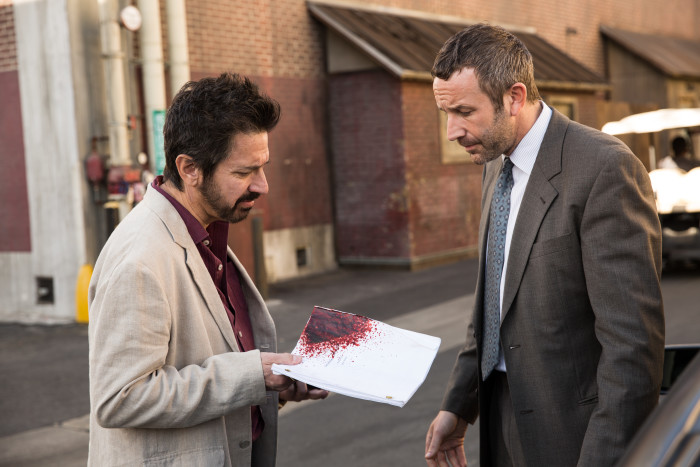 Sure, 20 years later he might've gotten out of the life. But he didn't, because you leaned into that.Holmes: He drove on the lot, or someone named Mr. Palmer drove on the lot.So Mr. Lovejoy has come out.Holmes: Back in whenever that was set.How do you even approach writing original scripts in Elmore Leonard style?Holmes: We really didn't worry too much about that. I was so inspired by Leonard and so in love with the story, it didn't really seem essential to me that the show and the scripts felt like they were written by him. I'm not sure that's what he would insist on if he was around. Really, it just gave us inspiration as a place to start to create something that's hopefully fresh and new, but owes debt to Leonard.The idea that Miles took the six month separation from his wife literally to the day was somewhat Leonard.Holmes: That's a great example, but it's really just a human thing. A big tough guy who has a vulnerability that he's been counting the days, he's been marking the days on his calendar, that's something that Leonard did really well which is make these characters human.As a director, is staging that dialogue very natural?Arkin: It has been for me. It's a byproduct of great writing that a way of staging it will reveal itself just in the process of honoring the words and the material and exploring what the actors' instincts are around those. So as is the case any time I've gotten to work with great material, it makes that part of it much easier.
Sure, 20 years later he might've gotten out of the life. But he didn't, because you leaned into that.Holmes: He drove on the lot, or someone named Mr. Palmer drove on the lot.So Mr. Lovejoy has come out.Holmes: Back in whenever that was set.How do you even approach writing original scripts in Elmore Leonard style?Holmes: We really didn't worry too much about that. I was so inspired by Leonard and so in love with the story, it didn't really seem essential to me that the show and the scripts felt like they were written by him. I'm not sure that's what he would insist on if he was around. Really, it just gave us inspiration as a place to start to create something that's hopefully fresh and new, but owes debt to Leonard.The idea that Miles took the six month separation from his wife literally to the day was somewhat Leonard.Holmes: That's a great example, but it's really just a human thing. A big tough guy who has a vulnerability that he's been counting the days, he's been marking the days on his calendar, that's something that Leonard did really well which is make these characters human.As a director, is staging that dialogue very natural?Arkin: It has been for me. It's a byproduct of great writing that a way of staging it will reveal itself just in the process of honoring the words and the material and exploring what the actors' instincts are around those. So as is the case any time I've gotten to work with great material, it makes that part of it much easier.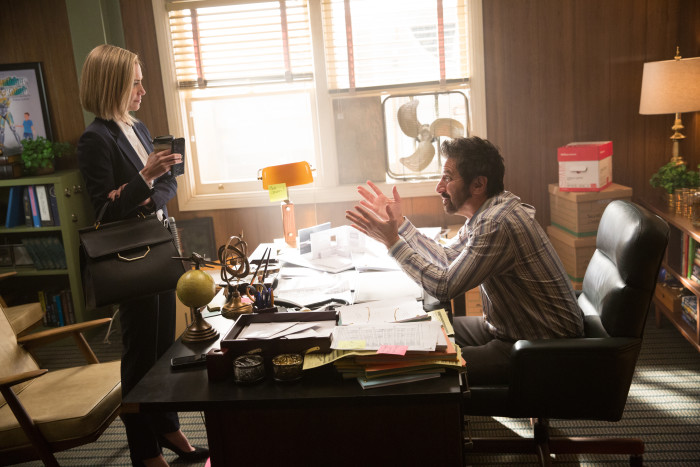 Was the single take where the hit men are driving away as the guys run after them tough to stage?Holmes: That was Allen Coulter. That was a lot of fun. We did not direct Goya [Robles], the actor, to kick the car and run up to the car. He just did that and we were ecstatic because it gave us a wonderful scene.Are you basically writing the movie that Miles is pitching week by week also?Holmes: Yeah, we would have to keep track as we came up with ideas for episodes because we end up backing ourselves into a corner. Not knowing where the movie in the show was going, we would write a couple scenes from it and then when we came to it later, we'd say, "All right, so what happened already in that movie? What were those characters' names?" We'd have to fold that in.Is there a Shorty somewhere in the story?Holmes: At the end of episode one it's revealed that Shorty is his daughter. He calls his daughter Shorty. He says, "Good night, Shorty."Will John Stamos have a cameo?Holmes: I hope so. It didn't work out this year, but I know he knows about it. We talked to him so moving forward there's a possibility.Does the Hollywood world or the gangster world account for more of the extreme sex and violence of this world?Holmes: In terms of themes, I think they both share. It's the collision of those two worlds so you can't really point to one or the other. It's smashing them up against each other.Arkin: It's the overlap of ruthlessness in both worlds.
Was the single take where the hit men are driving away as the guys run after them tough to stage?Holmes: That was Allen Coulter. That was a lot of fun. We did not direct Goya [Robles], the actor, to kick the car and run up to the car. He just did that and we were ecstatic because it gave us a wonderful scene.Are you basically writing the movie that Miles is pitching week by week also?Holmes: Yeah, we would have to keep track as we came up with ideas for episodes because we end up backing ourselves into a corner. Not knowing where the movie in the show was going, we would write a couple scenes from it and then when we came to it later, we'd say, "All right, so what happened already in that movie? What were those characters' names?" We'd have to fold that in.Is there a Shorty somewhere in the story?Holmes: At the end of episode one it's revealed that Shorty is his daughter. He calls his daughter Shorty. He says, "Good night, Shorty."Will John Stamos have a cameo?Holmes: I hope so. It didn't work out this year, but I know he knows about it. We talked to him so moving forward there's a possibility.Does the Hollywood world or the gangster world account for more of the extreme sex and violence of this world?Holmes: In terms of themes, I think they both share. It's the collision of those two worlds so you can't really point to one or the other. It's smashing them up against each other.Arkin: It's the overlap of ruthlessness in both worlds.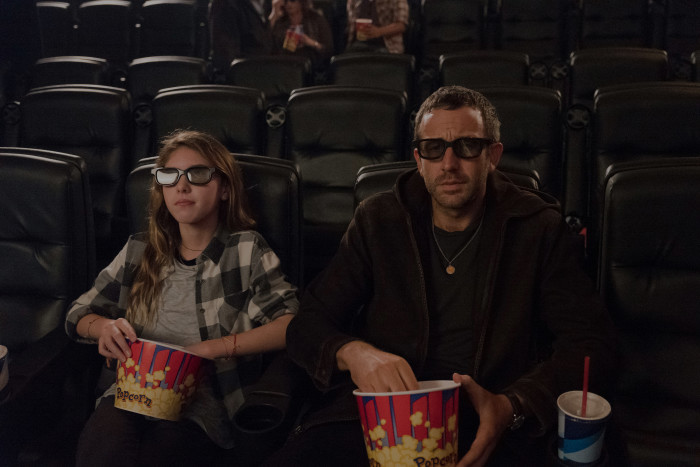 The audience knows so much about Hollywood from shows like Entourage or watching DVDs, does that make it easier to explain the business to them? Is it harder to impress people?Holmes: As long as it's not a retread of someone else's point of view about Hollywood. As long as it's a fresh take with real human beings then I'm not so worried about it. I do presume that there is a surprising amount of knowledge about the industry with viewers. Just from talkbacks to panels, I'm always amazed how closely people follow the entertainment business and how much they know about it.Arkin: When there are whole channels devoted to the business, there were times where there were discussions about whether we were being too inside with some of the show business references. Inevitably when we broke it down, it seemed pretty apparent that more and more the general population is very aware of what goes into a lot of the nuts and bolts of production.Holmes: The process is interesting. When you're watching The West Wing or ER, even if you don't exactly understand what they're talking about, it's interesting to lean into that .Arkin: When you're convinced the characters do know what they're talking about, it becomes compelling.Were there no restrictions on staying under an hour an episode?Holmes: There were very strong recommendations and they were nice enough to let us go over and under here and there. They really did want us within a range that was under an hour.How many seasons of this Get Shorty have you thought of?Holmes: I came in talking about the first three. I can imagine six and then we'll appraise where we are at that point.Arkin: I always thought 12 and out.Holmes: A nice concise 12 and out.Would each season be 10 episodes?Holmes: I suppose some could vary. 10 is a very nice number in which to tell a story.
The audience knows so much about Hollywood from shows like Entourage or watching DVDs, does that make it easier to explain the business to them? Is it harder to impress people?Holmes: As long as it's not a retread of someone else's point of view about Hollywood. As long as it's a fresh take with real human beings then I'm not so worried about it. I do presume that there is a surprising amount of knowledge about the industry with viewers. Just from talkbacks to panels, I'm always amazed how closely people follow the entertainment business and how much they know about it.Arkin: When there are whole channels devoted to the business, there were times where there were discussions about whether we were being too inside with some of the show business references. Inevitably when we broke it down, it seemed pretty apparent that more and more the general population is very aware of what goes into a lot of the nuts and bolts of production.Holmes: The process is interesting. When you're watching The West Wing or ER, even if you don't exactly understand what they're talking about, it's interesting to lean into that .Arkin: When you're convinced the characters do know what they're talking about, it becomes compelling.Were there no restrictions on staying under an hour an episode?Holmes: There were very strong recommendations and they were nice enough to let us go over and under here and there. They really did want us within a range that was under an hour.How many seasons of this Get Shorty have you thought of?Holmes: I came in talking about the first three. I can imagine six and then we'll appraise where we are at that point.Arkin: I always thought 12 and out.Holmes: A nice concise 12 and out.Would each season be 10 episodes?Holmes: I suppose some could vary. 10 is a very nice number in which to tell a story.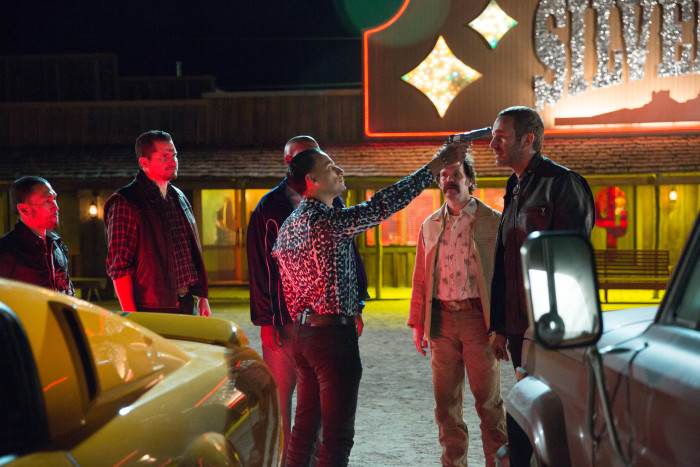 Did you do more research on the movie business or the gangster business?Holmes: Gangster business. Showbiz I have a lot of reference for, but how it really would work, the gangster business, trying to ground it to make it feel real and not like somebody else's TV show, we did a fair amount of research on what it is to be a criminal.Is it a coincidence you cast two leads primarily known for comedies in not necessarily comedic parts?Holmes: I think it's indicative of the tone we were trying to hit. We really did want some actors with comedy chops, but actors who were able to and eager to embrace the serious side of the role as well. Romano brings tragedy and seriousness to a role that could be just a clown. Chris, the same thing. Chris brings a very ominous, thuggish side to this guy even while he's being charming and seductive.Arkin: Still very much being himself. It's an amazing job of just incorporating aspects of his own nature. It's pretty seamless. Even at his toughest moments, you don't feel like it's some cloak that he's putting on himself. It's still very much him.Holmes: We get to see who Chris O'Dowd would be if he beat people up for a living.Arkin: Which I'm not so sure he doesn't.Are you able to use practical squibs for the gunshots?Arkin: It's dependent on the application. When it's been safe to use squibs or half loads, we have. When, for whatever reasons, it just felt like it would be safer for everyone, we've let safety be the determining factor.
Did you do more research on the movie business or the gangster business?Holmes: Gangster business. Showbiz I have a lot of reference for, but how it really would work, the gangster business, trying to ground it to make it feel real and not like somebody else's TV show, we did a fair amount of research on what it is to be a criminal.Is it a coincidence you cast two leads primarily known for comedies in not necessarily comedic parts?Holmes: I think it's indicative of the tone we were trying to hit. We really did want some actors with comedy chops, but actors who were able to and eager to embrace the serious side of the role as well. Romano brings tragedy and seriousness to a role that could be just a clown. Chris, the same thing. Chris brings a very ominous, thuggish side to this guy even while he's being charming and seductive.Arkin: Still very much being himself. It's an amazing job of just incorporating aspects of his own nature. It's pretty seamless. Even at his toughest moments, you don't feel like it's some cloak that he's putting on himself. It's still very much him.Holmes: We get to see who Chris O'Dowd would be if he beat people up for a living.Arkin: Which I'm not so sure he doesn't.Are you able to use practical squibs for the gunshots?Arkin: It's dependent on the application. When it's been safe to use squibs or half loads, we have. When, for whatever reasons, it just felt like it would be safer for everyone, we've let safety be the determining factor.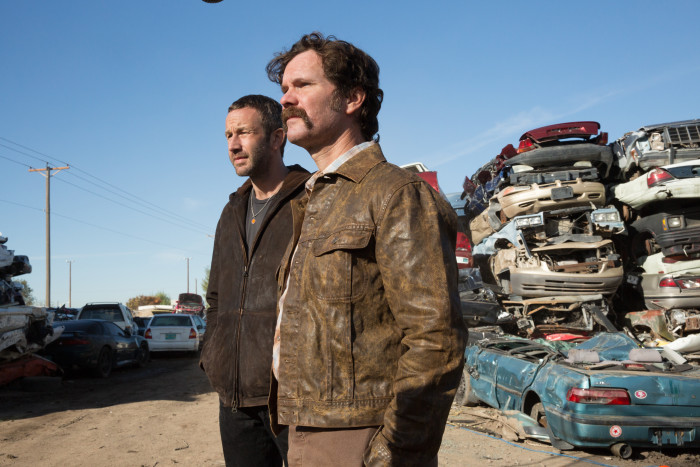 There's really no safe way to put a small explosive on someone's head, is there?Arkin: Head, no. But we're willing to try.Holmes: We do some practical stuff but VFX is amazing these days. If you don't want to, it's something that VFX is very good at.Arkin: Or using a subtle practical effect and then augmenting that, using that to build a visual effect on top of it.What do you feel is the awareness of Get Shorty today?Holmes: I think it's not in the forefront of people's minds the way it was for me when I was in my 20s. But there's generally an affectionate recollection of it but my biggest worry is that people will come to this expecting the movie for television and it's such a different tone and a different show. I'm actually quite happy to have a fresh start with it. Elmore Leonard is revered so that's both an intimidating challenge and a great help.Well, you made it new characters and started from scratch.Holmes: Yeah, it helps us dodge some of that expectation.
There's really no safe way to put a small explosive on someone's head, is there?Arkin: Head, no. But we're willing to try.Holmes: We do some practical stuff but VFX is amazing these days. If you don't want to, it's something that VFX is very good at.Arkin: Or using a subtle practical effect and then augmenting that, using that to build a visual effect on top of it.What do you feel is the awareness of Get Shorty today?Holmes: I think it's not in the forefront of people's minds the way it was for me when I was in my 20s. But there's generally an affectionate recollection of it but my biggest worry is that people will come to this expecting the movie for television and it's such a different tone and a different show. I'm actually quite happy to have a fresh start with it. Elmore Leonard is revered so that's both an intimidating challenge and a great help.Well, you made it new characters and started from scratch.Holmes: Yeah, it helps us dodge some of that expectation.
